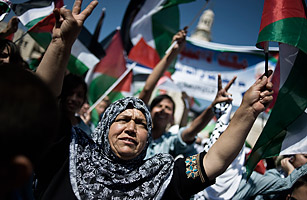
Palestinians rallying in Bethlehem
With the Mideast peace process as moribund as it has ever been, the leaders of the Palestinian Authority this year chose to appeal directly to the United Nations in their pursuit of statehood. In the months preceding the September U.N. General Assembly, Israeli and American officials warned against the move, arguing that such recognition could be gained only by first directly negotiating with Israeli interlocutors. But the Palestinians countered that the current right-wing Israeli government of Prime Minister Benjamin Netanyahu has shown little inclination to achieve a formalized peace and, particularly with its continuing expansion of Israeli settlements in the West Bank and in East Jerusalem, seemed antagonistic to the idea.
When Palestinian Authority President Mahmoud Abbas appeared at the U.N. in September and, with a stirring speech before the General Assembly, announced the attempt to achieve full recognition at the Security Council, he was greeted as something of a hero back home. But in subsequent months, the effort proved stillborn: the certainty of a U.S. veto, as well as pressure applied by Washington on other members of the Security Council, has almost guaranteed that the Palestinians' bid won't get off the ground and may not even reach the General Assembly, where the occupied territories could receive at least the symbolic gloss of international legitimacy.